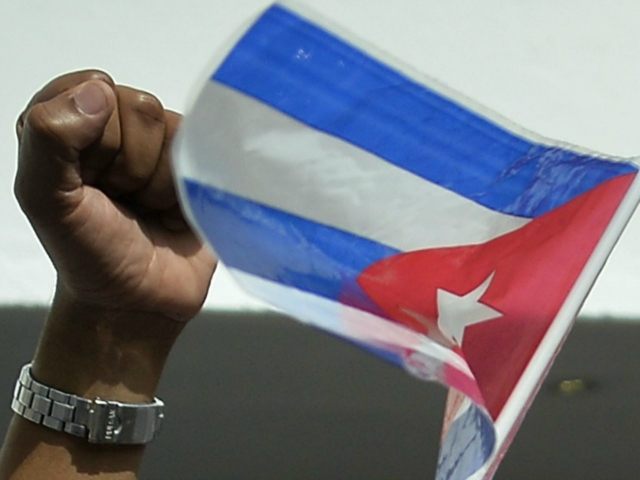Cuba’s communist propaganda newspaper Granma has published an article claiming that President Barack Obama’s scheduled visit to Havana in March “disproves” decades of evidence that the Cuban government violates the human rights of its citizens, on a weekend in which Cuban state police arrested almost 200 dissidents for peaceful marches against communism.
In a column titled “Four Myths Obama’s Trip to Cuba Disproves,” the newspaper cites “Cuba violates human rights” as the top “myth” that President Obama is helping to eradicate by visiting the island. The article calls the fact of Cuba’s rampant human rights violations “the mantra of those who want to justify as a philanthropic crusade the politics of aggression begun in 1959 before the advance of a socialist Revolution in their own backyard.” The fact that Cuba violates international human rights law on a routine basis, the article continues, “permeated realpolitik previous to the December 17, 2014 announcement,” referring to the day President Obama announced a number of concessions to the Raúl Castro regime in exchange for, in Castro’s words, “nothing in return.”
Granma also claims that President Obama’s decision to endorse the legitimacy of the Castro regime with his presence dismantles the allegation that “the ultra-right in Miami, especially legislators of Cuban origin, had totally held hostage the United States’ politics towards Cuba.” Cuban state propaganda often insults ethnic Cuban voters in Miami as “ultra-right” extremists, using terms like “the Miami Mafia” in an attempt to alienate Republican-leaning voters in the region. Cuban-American voters in Miami have also been consistently mocked and derided in American left-wing media, particularly the cable news pundits associated with NBC.
While Granma is open to using President Obama’s visit to promote the lie that the Cuban government does not oppress its dissidents, it continues to condemn the United States for defending human rights internationally. In a separate column published Saturday, the propaganda outlet condemns President Obama for not using executive orders to lift trade bans on Cuba, accusing his inaction of “keeping alive politics of aggression.”
President Obama is expected to meet with dictator Raúl Castro and “other Cuban people” during his visit, though it remains unclear whether he will be present in meetings with Cuban civil society or pro-democracy activists.
Whether any of Cuba’s most prominent dissidents will be out of jail during President Obama’s visit remains to be seen. If this weekend is any indication, there is little hope that the leaders of dissident groups will be allowed to attend events involving the President. Various dissident groups, including the Patriotic Union of Cuba (UNPACU) and the Ladies in White, staged multiple events across the island this weekend. More than 170 dissidents were arrested, including dozens of Ladies in White arrested for attending Sunday Catholic Mass. An estimated 40 Ladies in White are still in custody after their prayer march in Havana.
The silent marches against the Castro regime this week were dedicated to Orlando Zapata Tamayo, a prisoner of conscience who died during a hunger strike in 2010, and the four men killed in 1996 when the Cuban government shot down a plane belonging to the pro-democracy group Brothers to the Rescue, which included one U.S. citizen.
Cuban dissidents have called President Obama’s decision to visit the island “an error” and warn that “these sorts of visits bring a lot of collateral damage” with them. They note that more than 250 pro-democracy activists were arrested in September during Pope Francis’s visit to Havana, including one man who was beaten and arrested in front of Pope Francis for saying the word “freedom” too loudly near the Pontiff. (The Pope denied having seen the event occurring before him.)
According to the NGO People in Need, President Obama’s efforts to warm up to the Castro regime have significantly deteriorated conditions for dissidents on the island. “There has been no substantial improvement in regard to human rights and individual freedoms on the island. … [The Cuban government] has adapted its repressive methods in order to make them invisible to the scrutinizing, judgmental eyes of the international community, but it has not reduced the level of pressure or control over the opposition,” the group said in a report in December.

COMMENTS
Please let us know if you're having issues with commenting.